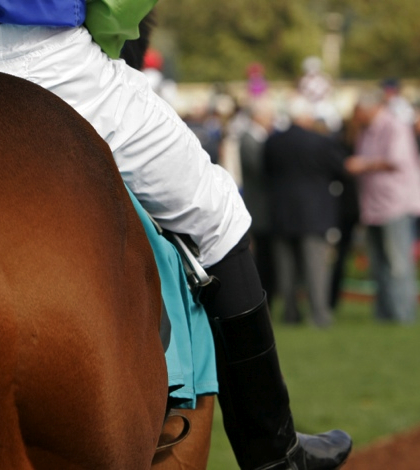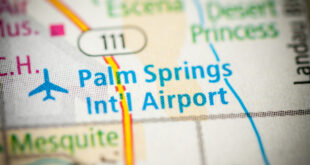The city in western Riverside County, already known for its love of horses, has approved an off-track betting project the could be ready by May. How much money it will put into the city’s general fund is anyone’s guess.
Norco, a city so steeped in horses that it calls itself Horsetown USA, is about to place a major bet on thoroughbred racing.
The city council has approved plans to transform the former Security Pacific Bank building at Hamner Avenue and Fourth Street into a restaurant, sports bar and off-track betting establishment.
The $2 million project, which was licensed last month by the California Horse Racing Board, will be open for business on May 3rd if everything goes as planned, according to Norco officials.
That happens to be the first Saturday in May, which is the day of the Kentucky Derby, the first leg of the Triple Crown and the most prestigious of all thoroughbred horse races.
Whenever the facility opens, Norco will be one of only 27 cities in California with some form of off-track betting, said Mike Marten, public information officer for the Sacramento-based horse racing board.
Off-track betting establishments have been popular in California from the time the state legislature made them legal in 1986.
“We’ve never had one close,” Marten said.
State law allows the off-track betting at several locations: “dark” race tracks, meaning tracks that are in their off-season and are not hosting races; fairgrounds, Native American casinos and betting rooms located in small businesses.
Norco’s facility will be in the latter category, which the legislature approved in 2009 after spending two years hammering out guidelines that divided the state into three zones: southern, which includes the Inland Empire, central and northern.
Those regulations include a prohibition on any two small satellite-betting sites within 20 miles of each other unless the original site gives its consent. They also limit to 15 the number of sites that can be set up in a zone, with priority given to sites likely to generate the most revenue.
The Norco facility’s nearest competition will be the National Orange Show in San Bernardino and the Finish Line Sports Grill at Fairplex in Pomona.
Mayor Berwin Hanna, who played a major role in getting the project to Norco after Corona rejected it last year, said an off-track betting facility is ideal for a city that revels in horse culture.
“I really don’t know how much it will help the city’s economy,” said Hanna, who was Mayor pro tem when he approached developer S&S Venues California LLC about bringing their project to Norco. “There are so many studies and numbers thrown around it’s hard to say, but I didn’t care about the [economic impact]. I would have gone after it anyway, because we’re Horsetown USA. When we heard rumors that Corona was going to turn it down we jumped on it.”
The project got a lukewarm reception from Corona’s business community, specifically from several restaurants, Mayor Karen Spiegel said.
“It’s not a bad concept, but there was enough opposition that we decided we couldn’t move forward with it,” Spiegel said. “We don’t mind having it next door to us because we don’t expect any spillover. We hope it does well.”
Norco incorporated in 1964 intending to promote city living in a rural atmosphere. To achieve that goal it eventually transformed itself into a horse community, building multiple horse trails and zoning the city so that residents could use their animals to commute, and not just for recreation.
Today the city – which began promoting itself as Horsetown USA about eight years ago – has more horse trails than sidewalks. Its residents can ride their animals into town and tie them near businesses like in the old west, and Norco’s politics are often horse-related issues being decided by elected officials who own horses.
It’s also home to several horse associations, including the Norco Horseman’s Association and the Norco Junior Horseman’s Association, and the city’s largest event center is the George Ingalls Equestrian Event Center.
“There’s no other city in California like it,” Hanna said. “No other city in the state is zoned the way we are.”
Fifteen years ago, a harness racing track and satellite wagering operation that would have been built immediately north of Norco was blocked by residents, but the S&S Venues project has prompted no significant opposition, not even from anti-gaming groups.
Reactions to satellite wagering projects can vary greatly depending on the community, but they don’t generally attract an unsavory crowd or hurt businesses close to them, Hanna said.
“We don’t want to attract a sleazy crowd to any part of the city, but I’m not concerned about that,” Hanna said. “People who bet on horses bet on horses, and people who don’t bet on horses bet on other things.”
Perhaps the question is how long will they keep betting on horses, either at the racetrack or at a satellite wagering operation.
Horse racing was once one of the most popular spectator sports in the United States, but its stature has fallen dramatically during the last 30 years or so. The industry’s latest casualty was Hollywood Park in Inglewood, which closed in December after 75 years in operation.
Multiple theories have been put forward to explain the sport’s slow demise, the most common explanation being the rise of other forms of legal gambling: Native American casinos, state lotteries and the legalization of betting by telephone and computer. In California, like a lot of states, there was a time when the only way to place a legal wager on a sporting event was to bet on a horse race, but those days are long gone.
Even satellite wagering has been a mixed blessing for the industry. An estimated 30 to 40 percent of the revenue generated by horse racing every year in California is the result of off-track betting, but the practice still hurts the gate, because off-track bettors don’t pay for parking, or patronize the concession stands or eat at the race track’s restaurant.
“The truth is that race tracks make very little money off betting,” Marten said. “They make their money in other areas, like selling food and drinks.”
Norco is probably making a good investment by bringing off-track betting into the city, said I. Nelson Rose, a professor at Whittier Law School and an expert on international gambling and gaming laws.
It’s true that horse racing has serious problems, but it’s not going to shut down soon, and some cities in Riverside County might regret not pursuing the S&S Venues project like Norco did, according to Rose.
“I think it was a brilliant move on Norco’s part to land that project,” Rose said. “It has to go somewhere, and even if it doesn’t work right away it will work eventually. When it does the city will have a monopoly. It will be the only off-site wagering within 20 miles.”
 IE Business Daily Business news for the Inland Empire.
IE Business Daily Business news for the Inland Empire.


